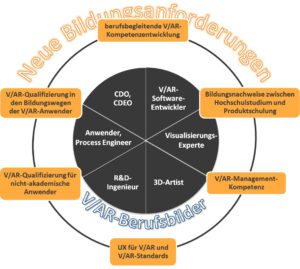Application Center VR/AR project
VDC is working on the new project “Application Center VR / AR” project, which is funded by the Baden-Württemberg Ministry of Economics, Labor, and Housing.
The Virtual Dimension Center (VDC) identifies necessary VR / AR competencies from the perspective of business and research.
Many companies have grappled with the workplace of the future in recent years. Virtual Reality (VR) and Augmented Reality (AR) are among the most interesting and promising technologies in this context. The question is not whether these will find their way into the world of work, but rather how strong the changes will be. With the change of the job, the training of the job also changes. It is, therefore, necessary to teach certain basic knowledge of the new technology during studies and training in order to respond to changes in job profiles. But which job profiles are affected and which knowledge domains are important for this? VR and AR (also VR / AR) are cross-sectional technologies and methods that can span a huge number of knowledge domains.
XR job descriptions and new requirements for the XR qualification
Currently, there is still a lack of a generally accepted or even just a documented competence profile for V / AR specialists. It is clear that it is completely unrealistic to want to convey all of the skills to a single job description. It would also not be economically expedient, as firstly not everyone needs to know everything, and secondly, highly paid specialists are not required for all V / AR-related activities. In order to implement V / AR successfully and sustainably in companies, the development of technological and organizational skills is required.
Currently, there is still a lack of a generally accepted or even just a documented competence profile for V / AR specialists. It is clear that it is completely unrealistic to want to convey all of the skills to a single job description. It would also not be economically expedient, as firstly not everyone needs to know everything, and secondly, highly paid specialists are not required for all V / AR-related activities. In order to implement V / AR successfully and sustainably in companies, the development of technological and organizational skills is required.
The VR / AR educational goal is clear on the abstract level: V / AR should be able to be used successfully in order to be able to work better, faster, more efficiently, more correctly, and more creatively. The VDC analysis now shows V / AR-oriented job profiles (see figure) and the V / AR competencies required for this. The VDC analysis also includes a great comparison of V / AR textbooks.

The entire reportApplikationszentrum VR / AR report, 15: AP3 -competence-building-VAR-education requirements can be found here.


